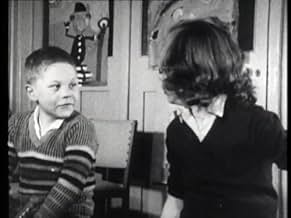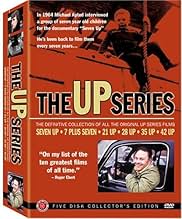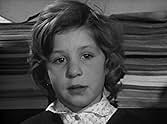Seven Up!
- Episode aired Nov 1984
- 40m
IMDb RATING
7.9/10
4.6K
YOUR RATING
Seven year old children from various backgrounds are interviewed on their hopes and aspirations for the future. It is hoped to follow them up in the year 2000 and see how things turned out.Seven year old children from various backgrounds are interviewed on their hopes and aspirations for the future. It is hoped to follow them up in the year 2000 and see how things turned out.Seven year old children from various backgrounds are interviewed on their hopes and aspirations for the future. It is hoped to follow them up in the year 2000 and see how things turned out.
- Awards
- 1 nomination total
Douglas Keay
- Self - Narrator
- (voice)
Bruce Balden
- Self
- (as Bruce)
Jacqueline Bassett
- Self
- (as Jackie)
Symon Basterfield
- Self
- (as Simon)
Andrew Brackfield
- Self
- (as Andrew)
John Brisby
- Self
- (as John)
Suzanne Dewey
- Self
- (as Suzy)
Charles Furneaux
- Self
- (as Charles)
Nicholas Hitchon
- Self
- (as Nicholas)
Neil Hughes
- Self
- (as Neil)
Lynn Johnson
- Self
- (as Lindsay)
Paul Kligerman
- Self
- (as Paul)
Michelle Murphy
- Self
- (as Michelle)
Susan Sullivan
- Self
- (as Susan)
Tony Walker
- Self
- (as Tony)
Derek Cooper
- Self - Narrator
- (voice)
- (uncredited)
Peter Davies
- Self
- (uncredited)
Wilfrid Thomas
- Self - Narrator
- (voice)
- (uncredited)
7.94.5K
1
2
3
4
5
6
7
8
9
10
Featured reviews
Talking without comprehension
The guiding principal is the quote "Give me a child until he is seven and I will give you the man." The filmmakers hope to follow these kids to see a glimpse of England in the year 2000. They follow a group of kids from varied background, and ask some probing questions.
I think most of the questions are over their head. While it's cute to ask these kids about girlfriends and love, the answers are basically meaningless. There's some interesting takes on fighting, the class system and blacks. We get limited information about their family life. Every once in awhile, they answer a question by giving a glimpse into their real lives. We need better answers by adults rather than answers from 7 year olds.
In the end, this is just setting up the rest of the series. The filmmakers get a lot of quotes that will be replay in the films to come. It's a baseline. At this point, we're just having a bit of fun watching cute kids talking without comprehension.
This is the first of an incredible series. Looking back, there are a lot of questions that the filmmakers didn't ask. If the film is taken as a stand alone, it is just a high class version of Kids say the Darndest the Things. But it is a good setup and we have to start somewhere. For that I'll give it a 7/10. If I have one minor change, they need to put the kids' names on the screen. It would make it easier to watch.
I think most of the questions are over their head. While it's cute to ask these kids about girlfriends and love, the answers are basically meaningless. There's some interesting takes on fighting, the class system and blacks. We get limited information about their family life. Every once in awhile, they answer a question by giving a glimpse into their real lives. We need better answers by adults rather than answers from 7 year olds.
In the end, this is just setting up the rest of the series. The filmmakers get a lot of quotes that will be replay in the films to come. It's a baseline. At this point, we're just having a bit of fun watching cute kids talking without comprehension.
This is the first of an incredible series. Looking back, there are a lot of questions that the filmmakers didn't ask. If the film is taken as a stand alone, it is just a high class version of Kids say the Darndest the Things. But it is a good setup and we have to start somewhere. For that I'll give it a 7/10. If I have one minor change, they need to put the kids' names on the screen. It would make it easier to watch.
Only two movies in and I'm drawn in completely
I've read about this series elsewhere and was always curious to see it. Thanks to an internet movie rental chain I've now seen 7 Up and 7 + 7, and the rest of the series is queued up and ready to ship. I can't wait.
Viewers who are not used to the various English accents will likely be struggling to understand what some of the kids are saying in the first movie, 7 Up, but it's a short film, and deserves repeated viewing. My vague memories of previous reviews of this series suggest that this may be the most lighthearted of the series. While it is fascinating for many reasons, it is also vastly enjoyable just for the experience of the 7 year-olds' high spirits and humor.
It's jarring when you get your first look at 7 + 7, which revisits most of the kids 7 years later. Their individuality, only hinted at in the first movie, is obvious in these now-14 year-olds. As a parent I feel that familiar combination of the sadness at the loss of the child and anticipation of the future adult. Here we run through this in a matter of minutes.
As it stands now, the series goes as far as 42 Up, somehow turning these frolicking little kids into my peers in the space of a few hours. (I've always been a sucker for special effects.) This series is unlike anything that came before it, and while a quick scan of titles suggests that it's been imitated since, I'm waiting to see what happens to this particular group.
Viewers who are not used to the various English accents will likely be struggling to understand what some of the kids are saying in the first movie, 7 Up, but it's a short film, and deserves repeated viewing. My vague memories of previous reviews of this series suggest that this may be the most lighthearted of the series. While it is fascinating for many reasons, it is also vastly enjoyable just for the experience of the 7 year-olds' high spirits and humor.
It's jarring when you get your first look at 7 + 7, which revisits most of the kids 7 years later. Their individuality, only hinted at in the first movie, is obvious in these now-14 year-olds. As a parent I feel that familiar combination of the sadness at the loss of the child and anticipation of the future adult. Here we run through this in a matter of minutes.
As it stands now, the series goes as far as 42 Up, somehow turning these frolicking little kids into my peers in the space of a few hours. (I've always been a sucker for special effects.) This series is unlike anything that came before it, and while a quick scan of titles suggests that it's been imitated since, I'm waiting to see what happens to this particular group.
Mesmerising
49 up was screened here i two episodes. Recent meetings with the participants were interwoven with flashbacks from the earlier interviews at ages 7, 14, 21, 28, 35 and 42. So beautifully put together. No sensationalism. No hopping about. Each interview subject was able to unfurl their lives in a steady pace that kept me enthralled throughout.
It's a breathtaking idea that grew out of an interest in finding out what happened to the original group after another 7 years when the children had become 14. The producers have kept in touch and most of the subjects have been more or less willing to be interviewed in the subsequent years.
This series of interviews, especially seen in the light of the fact that I am nearly as old as the people involved in this project, gave me so much. Seeing people live their lives, suffering set-backs, dealing with life's many stumbling blocks, gaining unexpected insights into themselves and their loved ones makes for a very gripping and fulfilling experience.
Absolutely marvelous. A gem.
It's a breathtaking idea that grew out of an interest in finding out what happened to the original group after another 7 years when the children had become 14. The producers have kept in touch and most of the subjects have been more or less willing to be interviewed in the subsequent years.
This series of interviews, especially seen in the light of the fact that I am nearly as old as the people involved in this project, gave me so much. Seeing people live their lives, suffering set-backs, dealing with life's many stumbling blocks, gaining unexpected insights into themselves and their loved ones makes for a very gripping and fulfilling experience.
Absolutely marvelous. A gem.
49 Up Interview with Michael Apted
I was interested to hear an interview with Michael Apted. I learned that the children selected at age 7 were those who were articulate and able to communicate clearly. The heads of various schools were asked to select their brightest and best for the project. As a social commentary, it is very interesting to see how they have developed over the years. Also, the various opinions and levels of participation from those around them, for example wives and husbands. By their very participation and reflection during the filming the participants have been altered. Clearly one participant felt quite misrepresented and wanted to set the record straight. In that sense, the film makers are not passive observers and some bias is inevitable. Despite this, it is a convincing personal commentary on more than 4 decades of British life.
A great start to a brilliant series
I first saw this about five years ago, and I couldn't wait to see the 7+7, 14, 21, 28 and 35, and am eagerly awaiting 42 up. It gets you in, it will make you want to know how these kids will turn out. I'm a lucky one, who didn't have to wait seven years for each of these episodes to come out.
If you have any interest in human behaviour, whether it be in kids or adults; if you wonder if what you thought you would be at seven, or fourteen is actually what you turn out to be; then you should watch this, and the rest of the series.
If you have any interest in human behaviour, whether it be in kids or adults; if you wonder if what you thought you would be at seven, or fourteen is actually what you turn out to be; then you should watch this, and the rest of the series.
Did you know
- TriviaAs this was originally conceived as a one-off, no long term contracts were drawn up with the documentary participants. The interviews since Seven Up! have been voluntary, but Michael Apted says the participants are paid for their appearance in each film, as well as equal parts of any prize the film may win.
- Quotes
Neil Hughes: When I get married I don't want to have any children because they're always doing naughty things and making the house untidy.
- Crazy creditsVoice-over during final credits: "If you want to see what happens to these children, look in at Granada Television on Tuesday, May the second ... in the year 2000."
- ConnectionsEdited from World in Action (1963)
Details
- Release date
- Country of origin
- Official site
- Languages
- Also known as
- 7 Up
- Production company
- See more company credits at IMDbPro
- Runtime
- 40m
- Color
- Sound mix
- Aspect ratio
- 1.33 : 1
Contribute to this page
Suggest an edit or add missing content






















